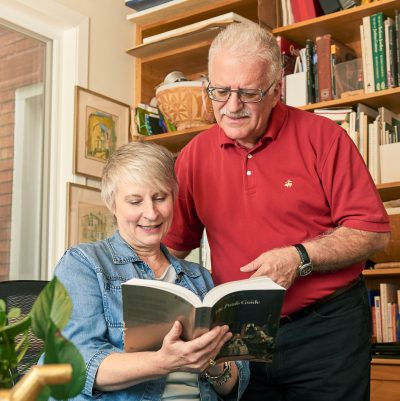
Donors Paula and Vicken Koundakjian
By Laura-Byrne Paquet
Photos: Jessica Deeks
Vicken Koundakjian’s family members fled Armenia during the 1915 genocide, going first to Syria and later to Lebanon, where Vicken, BAHons/04, grew up. Paula Fedeski-Koundakjian’s great-great-grandfather fled Poland for the United Kingdom.
“We think it’s really important that we all remember that somewhere in our families, all of us have a refugee,” says Paula. “Refugees are not a new thing. They’re a very ancient thing.”
The couple has become even more aware of refugee issues through their work around the world. After meeting at a translation school in Brussels, they moved to Canada, where Paula had spent her early childhood and university years. Vicken began a career with the Canadian diplomatic corps that eventually took them to Saudi Arabia, Iran, Nigeria, and Venezuela.
They realized that many programs for refugees help young children or their parents adapt to their new country, but teenagers often fall between the cracks. In many cases, young adults were enrolled in post-secondary education in their former countries but can’t afford tuition in their new home.
“We wanted to at least make an attempt at giving some of those kids a better chance of getting into a university program,” Paula explains. That’s how the idea of the Welcome to Canada bursary was born.
Philanthropy Within Reach
“It was actually Paula’s idea to call it Welcome to Canada, because that was the first thing that the immigration officer said to me,” Vicken says, remembering their arrival from Belgium in 1990. “We both got choked up, I’d say.”
Their plan is to donate to the bursary throughout their lives, then leave a portion of their estate to it after they are gone. They hope other donors—perhaps inspired by news of ongoing refugee crises throughout the world—will give as well. Such philanthropy is within everyone’s reach, they emphasize.
“We’re not millionaires,” says Paula with a smile. “We’re just ordinary folk.”
The process of working with Carleton was easy and straightforward, they agree. In fact, they are hoping to work more with the university to help refugees in other ways, perhaps by finding a way for business students to write business plans for refugees who were formerly entrepreneurs. “Canada is an incredibly exceptional country, and we want to make sure people understand and appreciate all that it can offer,” Vicken says.